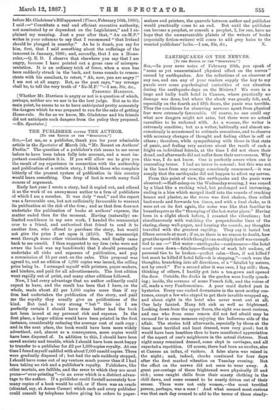THE PUBLISHER versus THE AUTHOR.
[To TM EDITOR 07 TRY n SPRCTAT08.1 SIR,—Let me, as a publisher, thank you for your admirable article in the Spectator of March 5th, "Mr. Besant on Authors' Profits." The question of a publisher's risk seems to me never before to have been taken fully into account, and a most im- portant consideration it is. If you will allow me to give you the result of my experience in connection with the authorship and publication of a certain story, I think those who complain bitterly of the present system of publication in this country would learn something. One drop of fact is worth many fluid ounces of argument.
Early last year I wrote a story, had it copied out, and offered it as the work of an anonymous author to a firm of publishers of which I am a member. It was duly " read," and the report was a favourable one, but not sufficiently favourable to warrant its publication at the risk of the firm ; and as that firm does not undertake the publication of books at authors' expense, the matter ended then for the moment. Having (naturally) un- limited confidence in my own work, I handed the manuscript over to a friend, and authorised that friend to send it to another firm, who offered to purchase the story, but would not give the price I set upon it (E150). The manuscript went through some other vicissitudes then, and finally came back to me unsold. I then suggested to my firm (who were not aware the book was my handiwork) that I should personally undertake all risks and expenses of publication, and pay a commission of 15 per cent. on the sales. This proposal was agreed to, and an edition of 5,000 copies was issued, the selling price being ls. I arranged myself with printers, paper-makers, and binders, and paid for all advertisements. The first edition went rapidly out of print, and many other editions followed.
Now, I had every advantage that no author ordinarily could -expect to have, and the result has been that I have, on the whole, made about 22 per 1,000 copies more than if my firm had undertaken the publication of the story, and paid me the royalty they usually give on publications of the kind. But (and a very strong " but " this is) I am perfectly certain I should have done better bad the book not been issued at my personal risk and expense. In the first place, a larger edition would have been printed in the first instance, considerably reducing the average cost of each copy ; and in the next place, the book would have been more widely advertised, and, almost as a consequence, more copies would have been disposed of. In addition to this, I should have been -saved anxiety and trouble, which I should have been most happy to transfer to a publisher for 22 per 1,000 copies royalty. At one time I found myself saddled with about 7,000 unsold copies. These were gradually disposed of ; but had the sale suddenly stopped, I should have come out of my venture much poorer than if I had been taking no risk and a publisher's royalty. Publishers, like other mortals, are fallible, and the error to which they are most prone—" over-printing "—is an error which is a distinct advan- tage to the author. If a publisher could foretell accurately how many copies of a book would be sold, or if there was an oracle (situated, say, at Amen Corner) which each and every publisher could consult by telephone before giving his orders to paper-
makers and printers, the quarrels between author and publisher would practically come to an end. But until the publisher can become a prophet, or consult a prophet, I, for one, have no hope that the unwarrantable plaints of the writers of books (especially fiction-writers) will cease to add grey hairs to the worried publishers' locks.—I am, Sir, &c., X.


































 Previous page
Previous page